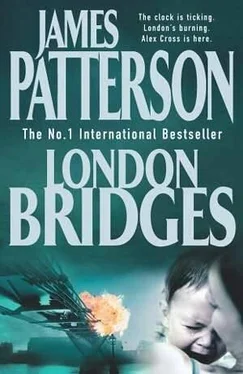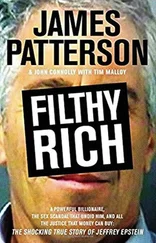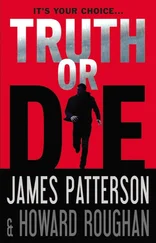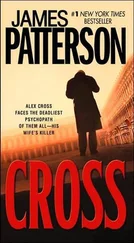I read a few reports about Shafer's years working as a procurer of mercenaries in Africa.
Then something hit me.
When he had traveled back to England recently, he'd used a disguise: he'd gone into the country in a wheelchair. He'd apparently traveled around London using the wheelchair disguise. It was also doubtful he knew that we knew.
It was a clue, and I put it into the system immediately. I flagged it as something important.
Maybe the Weasel was using a wheelchair in Washington.
And maybe we were suddenly one step ahead of him, instead of two steps behind.
On that note, I finally called it a night. At least, I hoped the day was finally over.
Very early the following morning, the Weasel made his way through crowded and noisy Union Station in a black, collapsible wheelchair, and he was thinking mostly happy thoughts. He liked to win, and he was winning at every twist and turn.
Geoffrey Shafer had very good military contacts in Washington, D.C., which made him extremely valuable to the operation. He had contacts in London, too, one of the other target cities, but that wasn't as important to the Wolf. Still, he was a player again and he liked the feeling of being somebody.
Besides, he wanted to hurt a lot of people in America. He despised Americans. The Wolf had given him an opportunity to do some real damage here. Zamochit. The breaking of bones. Mass murder.
Lately Shafer had been wearing his hair cut short, and he'd also dyed it black. He couldn't exactly disguise the fact that he was six foot two, but he had done something better-actually, he'd gotten this idea from an old associate. During daylight at least, he traveled around Washington in the wheelchair, a state-of-the-art model he could easily throw in the back of the Saab station wagon he was driving. If he was noticed occasionally-and he was-it was for all the wrong reasons.
At 6:20 that morning, Shafer met with a contact inside Union Station. They both got on queue-the contact standing behind Shafer-at a Starbucks. They struck up what appeared to be a casual conversation.
"They're on the move," said the contact, who worked as an assistant to a higher-up in the FBI. "Nobody listened to the warnings not to investigate. They've already moved surveillance into the targeted cities. They're looking for you here, of course. Agent Cross is assigned to you."
"I wouldn't have it any other way," Shafer said, and smiled crookedly, as he always did. He wasn't surprised about the surveillance. The Wolf had predicted it. So had he. He stayed in line and bought a latte. Then he pressed a button and the wheelchair rolled to a row of pay phones near the railway station's ticket booths. He sipped his hot drink as he placed a local call.
"I have some scut work for you. Pays very well," he said to the woman who answered. "Fifty thousand dollars for just an hour or so of your time."
"Well, then, I'm your scut," said the woman, who happened to be one of the world's very best snipers.
The meeting with the "subcontractor" took place just before noon in the food court at the Tysons Corner mall. Colonel Shafer met Captain Nicole Williams at a small table directly across from a Burger King.
They had burgers and sodas laid out in front of them, but neither ate what Shafer referred to as "godawful Yankee artery cloggers."
"Nice wheels," Captain Williams said with a smirk when she saw him arrive in the wheelchair. "You have no shame, do you?"
"Whatever works, Nikki." He returned her smile. "You know me well enough by now. Whatever the job takes, I get it done."
"Yeah, I know you, Colonel. Anyway, thanks for thinking of me for this."
"Wait until you hear about the job before you thank me," he said.
"That's why I'm here. To listen."
Actually, Shafer was already a little concerned; he was surprised that Nikki Williams had let herself go so much since the last time they'd worked together. He doubted that she was five foot six, but she must have weighed close to two hundred pounds now.
Still, Nikki Williams exuded the confidence of the highly skilled professional Shafer knew she had always been. They'd worked together for six months in Angola, and Captain Williams was very good at her specialty. She'd always delivered what was asked of her before.
He told Nikki Williams only her part of the job and repeated the fee, which was fifty thousand dollars for less than an hour's work. The thing he liked best about Nikki was that she never complained about the difficulty of any job, or even its risks.
"What's the next step for me? When do we go?" were her only two questions after he had detailed the basics, though not the actual target.
"Tomorrow at one you'll to be at Manassas Regional Airport in Virginia. An MD-530 helicopter will set down there at five past the hour. We'll have an HK PSG-1 on board for you."
Williams frowned and shook her head. "Unh-uh. If you don't mind, I'll bring my own. I prefer the Winchester M70, with 300 Win Magnum hollow-point boattails. I've field-tested them, know they're best for this kind of job. You said that glass has to be penetrated, right?"
"Yes, that's right, Captain. You have to shoot into an office building."
Shafer didn't object to the change in weapons. He had worked with plenty of snipers and knew they were always idiosyncratic, had their own peculiar way of doing things. He'd expected modifications from her and was surprised there weren't more, actually.
"So who's going to die tomorrow?" Nikki Williams finally asked. "I need to know that, of course."
Shafer told Captain Williams the target, and to her credit, she never raised an eyebrow. Her only reaction was "My price just went up. It just doubled."
Shafer nodded slowly. "Agreed. That will be just fine, Captain."
Then Nikki Williams smiled. "Did I settle too low?"
Shafer nodded again. "Yes, you did. But I'm going to give you one-fifty anyway. Just don't miss him."
We might have gotten a decent break in the case-finally, something, and it had started with a tip from me. The wheelchair! We had a lead.
At ten in the morning, I raced across Washington to the Farragut apartment building on Cathedral Avenue. Three years before, a partner of mine named Patsy Hampton had been murdered in the underground garage of the Farragut. Geoffrey Shafer had killed her. The Farragut was where his old therapist lived.
We'd had Dr. Elizabeth Cassady under surveillance for the past thirty-six hours, and it seemed to have paid off. The Weasel had shown up. He parked in the underground garage near where Patsy had been brutally killed. Then he went upstairs to the penthouse apartment, 10D, where Dr. Cassady still lived.
He'd come in a wheelchair.
I boarded an elevator with four other agents. We had our guns drawn and ready. "He's extremely dangerous. Please take what I'm saying seriously," I reminded them as we stepped from the elevator on the therapist's floor.
It had been painted since the last time I was there. So much of this was familiar, hauntingly so. I was getting angry all over again about Patsy Hampton's death, about the Weasel.
I pressed the bell at 10D.
Then I called out, "FBI, open the door. FBI, Dr. Cassady."
The door opened, and I was staring at a tall, attractive blond woman whom I recognized.
Elizabeth Cassady recognized me, too. "Dr. Cross," she said. "What a surprise. Well, no, it isn't really."
As she spoke I heard a wheelchair rolling up behind her. I raised my gun, pushing Dr. Cassady out of the way.
I aimed my weapon.
"Stop right there! Stop!" I shouted.
The wheelchair, and the man seated in it, came into full view. I shook my head and slowly lowered the gun. I held back a curse. I smelled a rat, or should I say a Weasel.
Читать дальше












